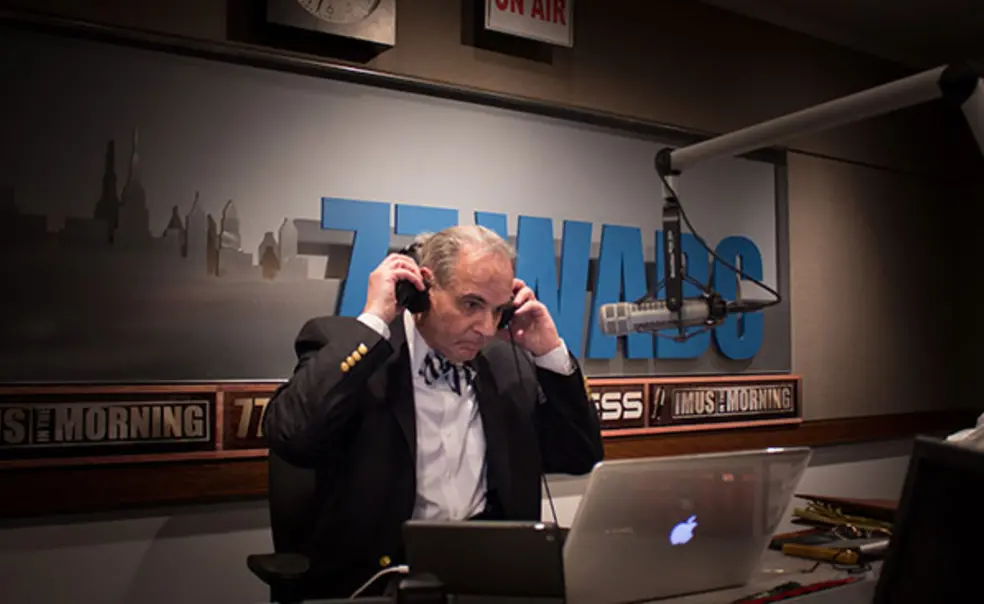Radio Host John Batchelor ’70 Battles Cancer — and Stays on the Air
John Batchelor ’70, a radio host and novelist, considers himself that artifact of the 20th century: the “good Princetonian.” For seven decades he didn’t smoke, drink, or otherwise partake in dangerous behavior.
So when Batchelor was diagnosed in October 2018 with oropharyngeal cancer — more specifically, a malignant tumor at the base of the radio host’s tongue that threatened his ability to speak on air — it came as a shock.
The John Batchelor Show markets itself as “an essential tool for understanding the new order in the 21st century.” Tune in after dark, online, and on radio stations across the country, and you will hear Batchelor from his 770-AM WABC studio in New York. In his knowing growl, he dissects the day’s news with journalists, authors, and commentators seven nights a week.
Cancer meant surgery and radiation, fatigue, and changes to his distinctive voice — maybe even no voice at all.
But the good Princetonian wasn’t about to let all that disrupt his work. “It’s a roulette wheel of life,” Batchelor said. On Nov. 2, Batchelor entered Memorial Sloan Kettering Cancer Center for surgery. He opted to walk into the operating room, through the maze of identical corridors, rather than ride a gurney.
Batchelor said he wasn’t scared until noticing a massive chart detailing his case for doctors as he lay down for surgery: “That was the time I realized that this was very serious business.”
He awoke to find the surgery a success. Batchelor then gave himself two weeks to learn to speak again. He was determined to be ready for a scheduled interview with Andrew Roberts, author of a new biography of Winston Churchill. To test himself, Batchelor read aloud to himself from Churchill: Walking With Destiny and whatever else he had at hand.
“One of the things I learned was there are way too many s’s in the English language,” Batchelor said. “Also, there are certain words you must avoid. One of the words you must avoid if your tongue was cut out and you’re trying to recover is the word ‘regularly.’ I’m still a little intimidated by the word. So ‘regularly’ disappeared into ‘routinely.’”
On Nov. 19, Batchelor recorded a 76-minute interview with the biographer Roberts. His tongue mostly held its own.
“I described it to Andrew as, ‘I have a manly Churchillian lisp,’” Batchelor recalled.
But all this was the easy part, Batchelor said. Next came six weeks of radiation therapy. This time, Batchelor was determined to stay on air throughout.
Every weekday for six weeks began with the radio host submitting himself to a robot that delivered precise doses of radiation to his neck. Strains of Steely Dan, the Eagles, or Creedence Clearwater Revival coming through his headphones, the radio host tried hard to remain perfectly still for the two or three songs he would play during these sessions.
“Radiation style is much more ballady,” he said.
By the end of the six weeks, Batchelor’s voice was ragged, an open wound on his neck leaked blood on his collar, and his well over 6-foot-tall frame had lost 15 percent of its weight.
And still Batchelor was determined to keep his show going. A plan to bring his show on the road to Azerbaijan in early March would continue, he confirmed.
“I don’t know if it helped, but it did give me something to do besides sit around and feel sorry about myself,” said Batchelor.
Experts say cancer of the type that Batchelor battled has seen a four- to five-fold increase over the past decade. Batchelor is now encouraging middle-aged men to have themselves checked for the largely symptomless cancer caused by HPV, the human papillomavirus.
Surviving cancer changed Batchelor in other small ways.
“You’re infinitesimally liberated moment by moment,” he said, recalling, for instance, suddenly hugging his tailor after having a suit altered.
Small changes to Batchelor’s long-running radio show and podcast could be coming, too. He will soon be adding a fantasy baseball segment to a show that usually focuses on politics and science. He justifies the change, saying it appeals to listeners between the ages of 12 and 30, a key advertising demographic (it also caters to his own fondness for America’s pastime).
“I don’t know if the cancer changed me about fantasy baseball,” he said, “but it did tell me to go ahead and do what you want.”












2 Responses
Bruce E. Smirnoff
7 Months AgoFan of John Batchelor
I have been a huge fan since 9/12/01. Thank you for enhancing my education, John. Wishing you great health.
Steve Wood
6 Years AgoA National Icon
Mr. Batchelor is a national icon and a fine Princeton man with a breadth and depth of understanding on cultural, international and national affairs that is unparalleled on national media. I faithfully listen to his broadcasts on a nightly basis and pray for his complete healing from his recent surgery.